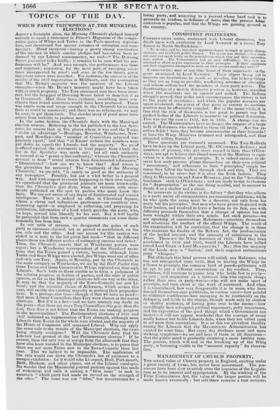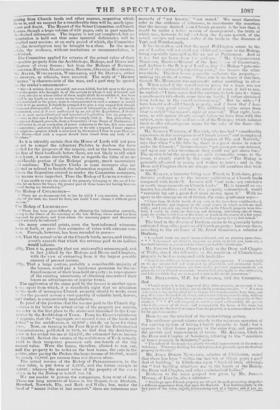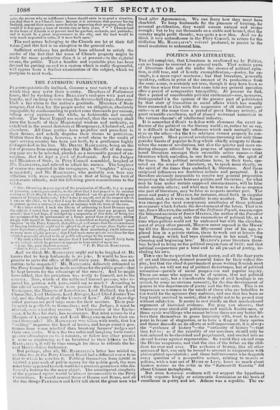MANAGEMENT OF CHURCH PROPERTY.
THE actual value of Church property in England, existing under a great variety of forms, has never been ascertained. The pos- sessors have been slow to satisfy even the inquiries of the Legisla- ture as to its amount and appropriation. By the working oh' the Tithe Commutation Act, the value of the larger portion will be made known eventually : but still there rematns a vast revenue,
arising from Church lands and other sources, respecting which there is, and we suspect for a considerable time will be, much ig:no- eince and doubt. The Report of the Select Committee on Church Leases, though a huge volume of 650 pages, only in part supplies he desired information. The inquiry is not yet completed, but no sapectation is held out that some material deficiencies will be ;implied next session; at an early period of which, the Committee the investigation may be brought to a close. In the mean ehile, the evidence, without resolutions or recommendation, is oublished.
The Committee applied for returns of the actual value of their respective property from the Archbishops, Bishops, and Deans and heaters of every diocese; but limin the Bishops of BaxGoe,
■ aLISLE, EXETER, GLOUCESTER, BRISTOL, OXFORD, ROCHEsTE Sr. ASAPH, WINCHESTER, WORCESTER, and ST. DAVID's, either Iu answers, or refusals, were received. The reply of " HENRY XETER " is characteristic of the man, and a part may be quoted mi the reader's amusement- " Sir—A written sheet, not sealed, nor even folded, but left open to the peru- of the porter who brought it, of the servant to whom it was delivered. and , every one else to whom either of them might think fit to exhibit it, has been iced in my hands on my return to my house this evening. * * * To the re- oe,t contained in the paper, were it communicated in such a manner as would ,otitle it to an answer, I should be compelhAl to give a very unqualified, though i hope not disrespectful, refusal. A demand of information, on the particulars ou merited, eren if it were authorized by an act of the Legislature, I should a most unconstitutional and tyrannical inquisition into my property : ,A2ver, in that case I might be bound to comply with it. But, proceeding, as pre•ent demand proceeds, from a Committee of one House of Parliament, I .H.uld resist it, as an usurpation of power unknown to the law, if it were urged imperative; and even while it purports to be only a request, 1 must express ,uy surprise—surprise which is increased by the respect I bear to your Honour. dile /louse—that such a request should have issued from any body of its As it is tolerably certain that the House of Lords will not pass :n act to compel the refractory Prelates to disclose the facts seeded for the purposes of the inquiry, and as the lessees, having he fear of their landlords before them, are not likely to tell what they know, it seems inevitable, that as regards the value of no in- mnsiderable portion of the Bishops' property, much uncertainty ;sill continue. The Chapter Clerks in some instances also ire- or refused to furnish the information required. And even e[tore the disposition existed to render the Committee assistance, :he means were imperfect. Thus the Bishop of LINCOLN writes- '. 1 am unable to state the value of the property belonging to the see of Lin- eoln, let on leases for lives; the greater part of those leases not having been re- oewed during my incumbency."
rho Bishop of CHICHESTER- " There are no documents left to :me by which I can ascertain the annual of the land, fee. leased for lives, nor could I now obtain it without great ,x pyrite."
The Bishop of LICHFIELD- " There has been great difficulty in obtaining the information correctly, ii big to the illness of the secretary of the late Bishop, whose mind has been impaired by paralysis, and from whom the necessary papers and documents emrld not easily be collected."
On many essential points, even the best-informed witnesses were at fault, or gave their estimates of value with extreme cau- sin. Enough, however, has been recorded to prove- t, That the actual value of the Church lands, mines,and timber, greatly exceeds that which the revenue paid to its holders would indicate.
2dly, That it is, generally (but not universally) mismanaged, and in fact jobbed by the Bishops and Deans and Chapters, with the view of extracting from it the largest possible amount of present income. 3dly, That a large portion, probably a considerable majority of the lessees, would pay a handsome premium for the en- franchisement of their leasehold property ; in consequence of the existing uncertainty of obtaining renewals of their leases on advantageous or regular terms.
The application of the sums paid by the lessees is another guess Ceti ; apart from which, it is manifestly right that an alteration in the mode of managing Church property should be made, since lesler the present .system a vast quantity of valuable land, houses, anil timber, is comparatively unproductive.
In proof of the position that the income paid to the Church dig- eitaries is far below the actual value of the property per annum, we refer in the first place to the statement furnished to the Com- in lyre by the Archbishop of YORK. From his Grace's calculation a appears, that the " aggregate net annual value if the lands and tahes" in the archdiocese, is 42,030/. ; chiefly on lease for three Oyes. Now, on turning to the First Report of the Ecclesiastical Commissioners, published in 1835, we find that the Archbishop e ave in his actual income at 12,629/., the estimated future income at 10,600/. So that the estates of the in elnliocese of Yolk actually yield to their temporary possessor only one-fourth of the Sidi' auntial value. Were the leases, therefore, allowed to run out, and the property to be re-let on the best terms, the gain to the public, after paying the Prelate the large income of 10,000/., would be nearly 33,000/. per annum from Ono diocese alone.
The actual income of the Bishop of PETERBOROUGH, in the -awe table, is put down at 3,1031., and the future receipts at
3,000.: whereas the annual value of the property of the e is
e lven in by the Bishop at 8,969/. 18s. 7d.
We are unable to pursue the comparison, from want of data. There are long accounts of leases in the Report, frem Durham, Hereford, Norwich, Ely, and Bath and Wells; but, under the head of " annua. lvalue at last renewal,' there are numerous me-
moranda of " not known,- " not stated.- We must therefore refer to the evidence if witne:se-:, to corroborate the assertion that the income derived i'.om Church property is far less than it would be under a bette;. system of management ; the truth of which may, however, ho infsreel front the fisares quoted, of the netted reeeipts and atmuid zedue of the lands in the dioceses of York and Peterborough.
It loss been often said that the ereat Paillinoton estate in the see of London will not yield any .ehlitional iHerone to the Bishop, being especially maromel wider an act of Parliament. And so it is ; hut we learn fr.ln Cle eviarice . Mr. CHRISTOPHER Hope:sox, Receiver-General of the Arciee 'sip of Canterbury, and Auditor te the Bi-hip 1..tid i, that tiee Bishop "gets one- third of tho continaal'y rents," the lessees the other two-thirds. The firet lessee senerally onilerlets the property,— making his prefit, of eourse. There can he no doubt of this fact. thoueh Mr. HonGsoer was appareutly rather unwilling to allow it. When asked if the coneiderition givea for a lease was not above the value caleulated on the number of years it had to run, he replied —"I have never had the curiosity to look into it : when a stentleumn's title-deeds Caine into my hands, I rather abstained from lookinu: at the (einsiil eation-maney? But he adds—" I have bon lilt and !edit Church prep rty, and I know that I hare given a rery groat ereces.'"fhe additiolial value arises from what is called "the teuant's right of renewal.' That right, how- ever, as will appear ch arty enoogli bef.re we have done with this subject, rests upw, the self-inierest of the Bishops ; which induces them n to offer advantageous terms far the sake of the fines—the cos in prres.nli.
Mr. Itonewr WRIGHT, of Norivich. who has had " considerable experience in the management of' (71inieli leases," and is employed for the Bishops awl Deins and Chapters of Ely and Norwich," says that when " a Idle Nis in, tlier is a great desire to renew under the Church ; " beeause lessees " get seven per cent. interest, and upon any other investment they could not get above four." The motive to let the property or euch 11‘vourable terms to the lessee, is clearly stated by tha some witness—" The Bishop is generally advanced in years, awl wishes to renew ; and in the Dean and Chapters there are always seine old members that wish to renew?
Mr. ELSLEV, a barrister living near Thirsk in Yorkshire, gives decisive evidence as to the inferios cultivation of Church lands compared with freehold. Le-see.; will " not make any extensive or costly improvements on Church hinds.- He is himself an ex- tensive leaseholder; awl were the property enfranchised, would " certainly lay out a great deal more money upon it.- With re- spect to the malmgement of (imber, the same gentleman says- " T have large fr(chnld woods of my. own in the immediate neighbourhood, which I cultivate and improve in the usoal comse in which woods are dealt: with ; and I can only nip', that if the woods on the Church property were free- hold, I could, by joiliei,Jus thirmieg and draining, and taking care of them, make the timber worth four or five times as much in the course of a few years. * • The state of the woods upon Church property is very bad indeed."
The land in the diocese of Durham seems to be generally better cultivated than °thus portiens of Church property ; but even there, according to the evi Immo of Mr. JOHN GREGSON, a solicitor of Durham, " Leasehold lands are 11111(.11 worse cultivated, and no planting upon them. * • * Yon cannot. set ,,bout to improve an estate in which you have on Is a leasehold interest, as vat would to ‘vhere you had the inheritance."
Mr. Jossen Lovest., Chapter Clerk to the Dean and Chapter of Wells, stated the dasrence ill the condition of Church-lease property in laed as compared with freeheld-
" 1 thiah the d:lfereace betwcen the two is quite apparent. T e estates held on the are ornamented mil MI:trove:I by plantations and .ithstantial MOH- i:gs, and other ;min-oven:ems ate there made ; and etch improvements do iet generally Mflow Church possession : tenants 10,1 principally to the cultivation, and I do not think they are in so good is state as fee•simide possessions."
AIr. Pnittrorrs, M.P. for Glcueester, told the Committee, that .• Church prmcrty is less improved than other prorerty, on account of the tenure ureler which it is holden, and dicidedly more improvealde. * If a man trait) nelkes up wind not to terwW, %%1i:eh some partie: have done, you may. then have :he *land av,a1,1 (rut, and dotcrior.ted very considerably, without having the pow, r f calling t.11“../ pities u aeroont for the impropriety of their condnot. * *estiir ilh.perty is na in ru!tieut,i by the pe:yon who is the owror ri the trim; and conse4pu at Iv the lessee of the term It only to look for the rent that collies front the propel ty as a remuneration to him for his purehase-money."
Here we see the mischief of the under-letting system.
The evidence quoted relates chiefly to the injurious operation of the existing system of lettine Church property irt land ; but it enliven; to affect house property in the same way, and prevents the growth and improvement of towns. Mr. ALVORD, Clerk to the Dean and Chapter of Salisbury, referring to the " condition of house property in Salisbury," says- " The nature of the. tenure lies greatly retarded improvement in the town or Salisbury. When any building has taken place, it is geuorady upon the freehold property in the city."
Mr. JOHN DIXON Nswmtvo, solicitor of Chiehester, stated that there has been " within the last ten or fitteen years a geet. deal of building iii Chichester upon " freehold land,- althougis the " best building situations are ia the hands of the Bishop. the Dean and Chapter, and otter ecclesiastical bathes." Eviderce to the same purport was given Ly Mr. JOSE,,i-: MOORE, of Lincoln, also a solicitor- " Buildings upon Church property are old awl decayed, presentiog altogether a different appearance from that upon the freehold. You find frequently in the
best parts of the town, ar(old., down-coming sort of a house ;_and,f you in- - quire the reason why so indifferent a house should exist in so good a situation, you find that it is a Church.lease: because it is notorious that persons having freehold, expend their money more freely in improving their property, than they
would if it was upon a lease of twenty-one or forty years. '1' Church-land in the heart of Lincoln is at present used for gardens, orchards, and paddocks; and it would be a great improvement to the city, and the land would be very much improved in value, if it were built upon."
The coal-mines belonging to the Church are let at their full value ;land this fact is an exception to the general rule.
Sufficient evidence has probably been adduced to satisfy the reader of the fact that the mass of Church property might be made far more productive than it is at present—to the rightful miner, the public. That a feasible and equitable plan has been devised for putting an end to a system which is really disgraceful, will appear from a further examination of the subject, which we postpone to next week,




























 Previous page
Previous page